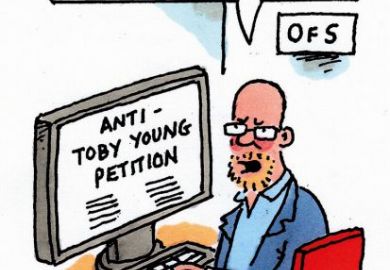
Being physically attractive is more likely to make people lean rightwards in their political beliefs, some new academic research has suggested. A study published in the Journal of Public Economics concludes that, because those who are good-looking face fewer hurdles and are treated better by those around them, they develop a cognitive bias that prevents them from properly understanding others’ hardship, The Guardian reported. The authors, Rolfe Daus Peterson of Susquehanna University and Carl Palmer of Illinois State University, used data from national US studies and a longitudinal study of high school students for their findings. For those looking at some members of the UK’s current Cabinet and scratching their heads, Professor Peterson had some reassurance. “All attractive people are not conservative, and not all unattractive people are liberals,” he said, although he added that attractiveness gave people “a small push in the conservative direction”.
English universities that fail to offer degree apprenticeships should lose a significant part of their public funding, a former minister has argued. Robert Halfon, who chairs the Commons Education Committee, used a speech in London on 5 February to call for an end to the “UK’s obsession with academic degrees” and to demand a dramatic increase in the delivery of technical training at universities. Speaking at the Centre for Social Justice, Mr Halfon said that the UK had become “obsessed with full academic degrees” even though many graduates earned only “paltry returns” despite racking up £50,000 in debt at university. A large portion of universities’ public subsidy should instead be ring-fenced to ensure that they offer degree apprenticeships, thereby “rebalancing” the UK’s system towards high-quality technical education, said Mr Halfon, whose suggestion will probably not go down well with champions of university autonomy.
A Swiss university is giving students the chance to study yodelling to degree level for the first time, The Local news website reported on 30 January. Lucerne University of Applied Sciences and Arts will offer both undergraduate and master’s degrees in the traditional alpine singing style from next autumn, with students required not only to master the practice but also to study its theory, history and business, the site said. The degree will be taught by Nadja Räss, a Swiss yodelling star who runs her own yodelling academy in Zurich, who predicted that the “whole yodelling scene” would benefit from the new graduates’ skills. That only “three or four” students are expected to enrol on the course this year, however, suggests that the “yodelling scene” has some way to go before it eclipses Taylor Swift and Ed Sheeran in the charts.
New universities minister Sam Gyimah was quick to wade into an incident in Bristol marked by arch-Brexiteer Jacob Rees-Mogg getting caught up in a scuffle with protesters at a student event. “Extremely disappointed that a genuine opportunity to engage in debate was nearly thwarted by thuggish behaviour,” Mr Gyimah tweeted on 2 February after footage emerged of the MP trying to break up a fracas at the University of West of England earlier that day. He was quickly outdone by his predecessor, Jo Johnson, who used Twitter to condemn the footage of what he called “balaclava-wearing thugs no-platforming Jacob Rees-Mogg”. However, this tweet was soon picked apart by critics, several of whom pointed out that Mr Rees-Mogg had given his speech after perhaps unwisely involving himself in the melee. The uninvited ex-students were booted out of the lecture hall by university-employed security, they added, while others wondered if Mr Rees-Mogg’s entourage had inflamed the situation. Far from shutting down free speech, it seems that UWE did a decent job of ensuring that the pro-Brexit MP received a fair hearing.
A society for Labour students at the University of Liverpool had to issue a statement insisting that it was not in favour of killing the Queen after a “tongue-in-cheek” Twitter post on the anniversary of Charles I’s execution. The tweet – which carried an engraving illustrating Charles’ beheading in 1649 – wished followers a “Happy #RegicideDay, comrades!” before declaring “we did it once, we can do it again”, The Independent reported. However, the society later deleted the post and issued an apology after an inevitable social media backlash ensued. “It was intended as a tongue-in-cheek comment. We obviously do not advocate regicide. We apologise for any offence caused,” the club said.
Register to continue
Why register?
- Registration is free and only takes a moment
- Once registered, you can read 3 articles a month
- Sign up for our newsletter
Subscribe
Or subscribe for unlimited access to:
- Unlimited access to news, views, insights & reviews
- Digital editions
- Digital access to THE’s university and college rankings analysis
Already registered or a current subscriber?





